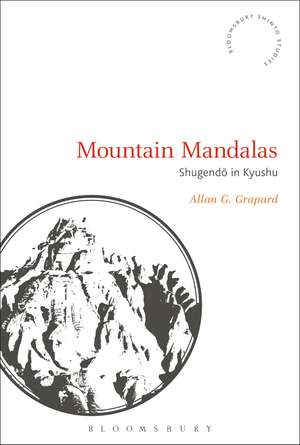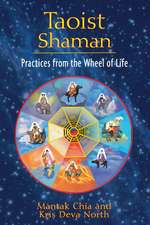Mountain Mandalas: Shugendo in Kyushu: Bloomsbury Shinto Studies
Autor Allan G. Graparden Limba Engleză Paperback – 23 aug 2017
| Toate formatele și edițiile | Preț | Express |
|---|---|---|
| Paperback (1) | 259.25 lei 6-8 săpt. | |
| Bloomsbury Publishing – 23 aug 2017 | 259.25 lei 6-8 săpt. | |
| Hardback (1) | 775.19 lei 6-8 săpt. | |
| Bloomsbury Publishing – 24 feb 2016 | 775.19 lei 6-8 săpt. |
Preț: 259.25 lei
Preț vechi: 296.30 lei
-13% Nou
Puncte Express: 389
Preț estimativ în valută:
49.61€ • 51.61$ • 40.96£
49.61€ • 51.61$ • 40.96£
Carte tipărită la comandă
Livrare economică 12-26 aprilie
Preluare comenzi: 021 569.72.76
Specificații
ISBN-13: 9781350044937
ISBN-10: 1350044938
Pagini: 320
Ilustrații: 10 bw illus
Dimensiuni: 234 x 158 x 23 mm
Greutate: 0.45 kg
Ediția:NIPPOD
Editura: Bloomsbury Publishing
Colecția Bloomsbury Academic
Seria Bloomsbury Shinto Studies
Locul publicării:London, United Kingdom
ISBN-10: 1350044938
Pagini: 320
Ilustrații: 10 bw illus
Dimensiuni: 234 x 158 x 23 mm
Greutate: 0.45 kg
Ediția:NIPPOD
Editura: Bloomsbury Publishing
Colecția Bloomsbury Academic
Seria Bloomsbury Shinto Studies
Locul publicării:London, United Kingdom
Caracteristici
Provides a new theoretical approach which moves beyond Shugendo as folk religion
Notă biografică
Allan G. Grapard is Professor Emeritus in the Department of East Asian Languages and Cultural Studies at University of California, Santa Barbara, USA.
Cuprins
IllustrationsPrefaceOrganization of the BookAcknowledgementsA Note on Translation and Text1. Shugendo and the Production of Social SpaceKyushu Island: an ignored worldThe Hachiman cult's nebulous originsUsa: from prehistoric village to cultic cityOracular pronouncements as divine directivesThe early Heian period: Iwashimizu HachimanThe Kunisaki Peninsula's links to UsaMount Hiko2. Geotyped and Chronotyped Social SpacesHachiman's traveling iconsMount Hiko: of swords, meteors, dragons, and goshawksWaiting for dawn on Mount Hiko: the geotype and chronotype of heterotopiaMount Hiko's Sacred Perimeter: four corners and three dimensionsAltitude and altered states of mind: creating a DojoMandala templates: divine planningGeotyped and chronotyped, encoded, mandalized bodiesThe visionary imperative3. Festivities and Processions: Spatialities of PowerMount Hiko as a socio-ritualized spaceMount Hiko's conflicts with Mount Homan and the Shogo-in monzekiMount Hiko's ritual calendarThe New Year's shusho tsuina rite: expel and inviteThe shusho goo rite: paper, pill, oathThe kissho shugi rite: sanctioning power and rankMountain sanctuaries awash in seawater: the shioitori riteFor the birds: the Zokei goku riteThe Matsue and Ondasai ritual festivitiesMineiri: the mandalized peregrinationsMandalized itinerariesPractices in the mountainsThe Daigyoji shrines and waterUsa Hachiman's oracular spatialitiesKunisaki: a much-disturbed heterotopiaThe geognostic realm of the lotus in KunisakiCoursing through the peninsula4. Shattered Bodies, Statues, and the Appeal of Truncated MemoryMount Hiko's quasi-destruction and fall into irrelevanceKunisaki: one breath away from the void of modernityHachiman's return in disguiseAfterword: From Spatialities to DislocationRays of lightGlossaryNotesBibliography Index
Recenzii
Rich in details and thought-provoking as it provides an approach to aspects of Japanese religiosity through a focus on "spaciality" which is the guideline throughout this volume . extremely important and useful . a major contribution on this topic with interesting cross-references .
Mountain Mandalas is thought provoking and Grapard's prose, ever inventive and sometimes even amazing, makes it a fun read . It is a rich and rewarding book for specialists in Japanese religious history and should provoke a range of discussions and further research for years to come.
Mountain Mandalas marks the culmination of many years of research by a scholar of great erudition. The author's pioneering insights and lengthy translations of primary sources-most (all?) presented for the first time in English-deserve thankful praise.
In Mountain Mandalas Allan Grapard writes with the confidence and clarity of a seasoned scholar to provide an illuminating and thought-provoking history of the Japanese Shugendo tradition in Kyushu. His study of Mount Hiko, Usa-Hachiman, and the Kunisaki Peninsula is a methodologically sophisticated work that effectively draws from the disciplines of geography, history, anthropology, sociology, and humanistic geography. Grapard has a singularly masterful command of the long sweep of Japanese religious history and the broad reach of Japanese religious geography. Mountain Mandalas makes for fascinating reading by anyone interested in how complex Buddhist doctrinal ideas were mapped onto striking topographic arrangements through the process of "mandalization" and the way that the landscape of premodern Japan was shaped as much by sophisticated minds as it was by their skillful hands. Readers will be delighted by Grapard's extremely interesting forays into Hiko's "nocturnal architecture," the lore and symbolism surrounding swords, institutional history, ritual analysis, visualization, and the labyrinthine symbolism of Esoteric Buddhism. Grapard's book provides a compelling model for the way other religious sites might best be studied from a geographical and historical perspective.
Allan Grapard's book is a rich, brilliant and thought-provoking exploration of Shugendo (Japanese mountain cults). Focusing on three adjacents regions in the northeastern part of Kyushu island (Mount Hiko, Usa, and the Kunisaki Peninsula), it combines a broad interdisciplinary approach, a deep knowledge of the textual tradition, and an imaginative interpretation. It will be a landmark in the study of Japanese religion.
Mountain Mandalas is the marvellous outcome of many years of work, and a profoundly insightful analysis of historical sources. Mountain Mandalas enhances our knowledge of Hachiman.
Mountain Mandalas is thought provoking and Grapard's prose, ever inventive and sometimes even amazing, makes it a fun read . It is a rich and rewarding book for specialists in Japanese religious history and should provoke a range of discussions and further research for years to come.
Mountain Mandalas marks the culmination of many years of research by a scholar of great erudition. The author's pioneering insights and lengthy translations of primary sources-most (all?) presented for the first time in English-deserve thankful praise.
In Mountain Mandalas Allan Grapard writes with the confidence and clarity of a seasoned scholar to provide an illuminating and thought-provoking history of the Japanese Shugendo tradition in Kyushu. His study of Mount Hiko, Usa-Hachiman, and the Kunisaki Peninsula is a methodologically sophisticated work that effectively draws from the disciplines of geography, history, anthropology, sociology, and humanistic geography. Grapard has a singularly masterful command of the long sweep of Japanese religious history and the broad reach of Japanese religious geography. Mountain Mandalas makes for fascinating reading by anyone interested in how complex Buddhist doctrinal ideas were mapped onto striking topographic arrangements through the process of "mandalization" and the way that the landscape of premodern Japan was shaped as much by sophisticated minds as it was by their skillful hands. Readers will be delighted by Grapard's extremely interesting forays into Hiko's "nocturnal architecture," the lore and symbolism surrounding swords, institutional history, ritual analysis, visualization, and the labyrinthine symbolism of Esoteric Buddhism. Grapard's book provides a compelling model for the way other religious sites might best be studied from a geographical and historical perspective.
Allan Grapard's book is a rich, brilliant and thought-provoking exploration of Shugendo (Japanese mountain cults). Focusing on three adjacents regions in the northeastern part of Kyushu island (Mount Hiko, Usa, and the Kunisaki Peninsula), it combines a broad interdisciplinary approach, a deep knowledge of the textual tradition, and an imaginative interpretation. It will be a landmark in the study of Japanese religion.
Mountain Mandalas is the marvellous outcome of many years of work, and a profoundly insightful analysis of historical sources. Mountain Mandalas enhances our knowledge of Hachiman.




















